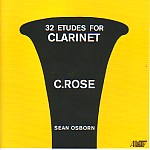The reputation of clarinetist Cyrille Rose (1830-1903) rests on his 32 pedagogical etudes. Although they cover a wide spectrum of technical and expressive challenges particular to 19th-century clarinet repertoire, these pieces actually are based on the 48 studies Franz Wilhelm Ferling composed for solo oboe. Rose transforms Ferling’s texts to suit the clarinet’s particular idiom and range, and even throws in passages from Bach in Nos. 16 and 20. In his booklet notes, clarinetist Sean Osborn addresses each etude’s particular difficulty, from the treacherous leaps in Nos. 8 and 26 to No. 18’s whirling runs, No. 5’s multitude of articulations, plus the long, sustained, touchingly lyrical lines throughout Nos. 15, 17, and 31. More importantly, Osborn’s impeccable technique and evenly modulated tone (what smoothness in the lowest register!) transcend these works’ didactic purpose in order to make music. The sonics give an impression of how Osborn might sound in a small hall, together with pronounced key clicks and intakes of breath that may give some listeners cause for concern, yet don’t bother me in the least. Serious clarinetists and clarinet lovers surely will want to know about this release. [7/24/2007]
































